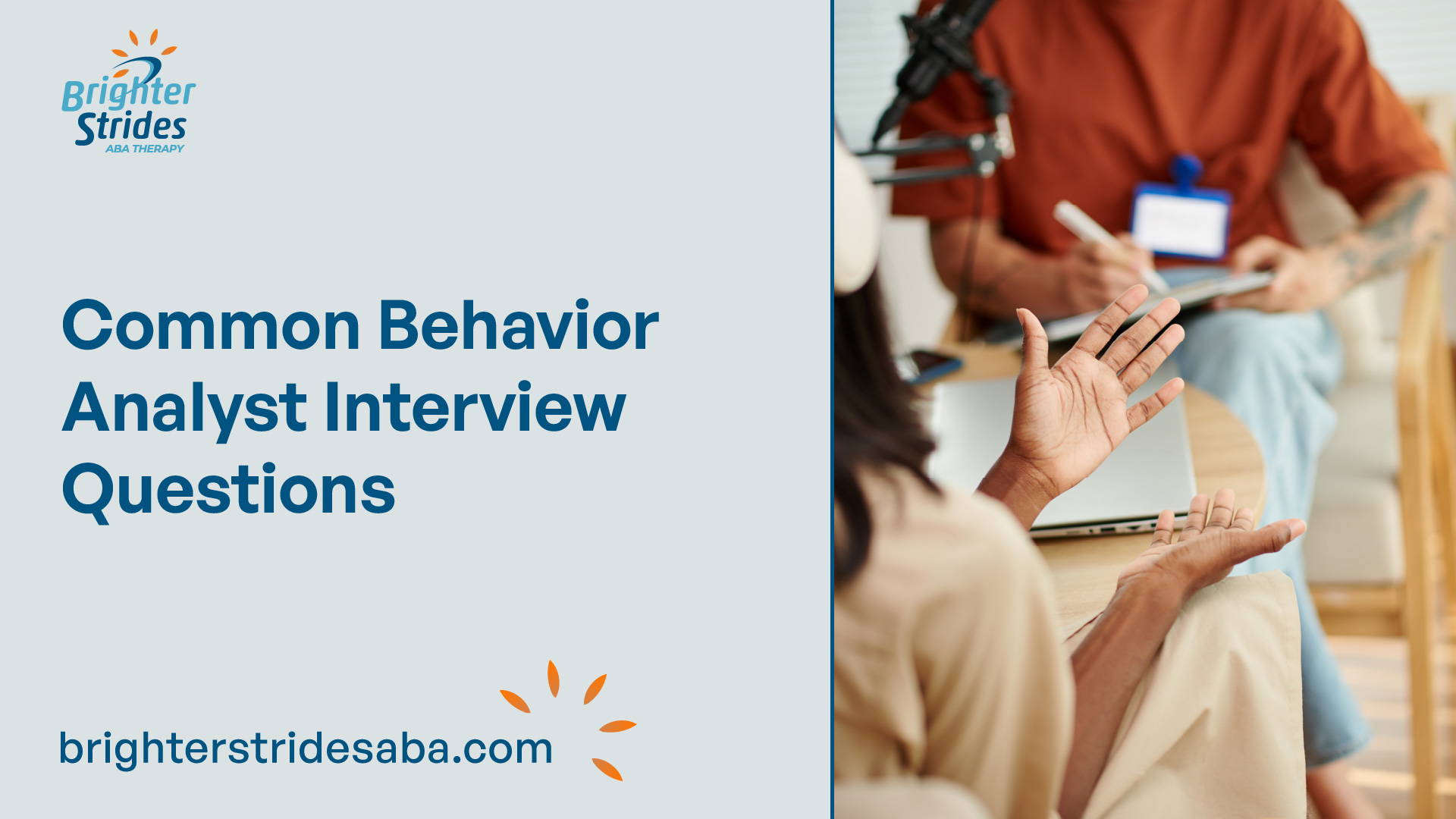
Introduction to Behavior Analyst Interviews
Behavior analysts play a crucial role in analyzing human behavior, understanding the environmental factors that influence behavior, and designing effective behavior interventions. They often work with teachers, school staff, and other professionals in multidisciplinary teams to develop strategies for managing problem behaviors and creating positive learning environments.
When preparing for a behavior analyst interview, it is essential to have an understanding of the field of behavior analysis and the specific skills and knowledge required for the role. This section will provide an overview of what to expect in a behavior analyst interview, including the types of questions that may be asked.
What to Expect in a Behavior Analyst Interview
During a behavior analyst interview, candidates can anticipate questions that assess their knowledge, skills, and experience in behavior analysis. The interviewers will be interested in evaluating the candidate’s ability to apply behavior analysis principles, conduct functional behavior assessments (FBA), develop behavior support plans, collaborate with interdisciplinary teams, consider ethical considerations, and collect and analyze data in behavior analysis.
The interview questions may explore various aspects of behavior analysis, such as:
- Knowledge of Behavior Analysis Principles: Candidates may be asked about their familiarity with principles of reinforcement, punishment, extinction, and generalization .
- Experience with Functional Behavior Assessment (FBA): Candidates may be expected to demonstrate their competence in conducting FBAs and designing individualized behavior support plans tailored to the unique needs of clients or students .
- Developing behavior Support Plans: Interview questions may focus on the candidate’s approach to developing and implementing behavior support plans, ensuring that they are evidence-based and effective in promoting positive behavior change .
- Collaboration and communication skills: Candidates may be asked to provide examples of collaboration with interdisciplinary teams, including educators, therapists, parents, and other professionals involved in behavioral support.
- Ethical Considerations in Behavior Analysis: Questions may address the candidate’s understanding and application of ethical guidelines and professional standards in behavior analysis practice, such as maintaining client confidentiality and ensuring informed consent.
- Data Collection and Analysis in Behavior Analysis: Candidates may be expected to demonstrate their knowledge of data collection methods, behavior assessment tools, and behavior change procedures used in applied behavior analysis practice.
It is important for candidates to prepare for the interview by reviewing behavior analysis principles, brushing up on their knowledge of assessment and intervention techniques, and being able to provide concrete examples of their experience and skills in behavior analysis.

By understanding what to expect in a behavior analyst interview and being well-prepared, candidates can confidently demonstrate their expertise and suitability for the role. The next section will delve into common behavior analyst interview questions to help candidates further prepare for their interviews.
Common Behavior Analyst Interview Questions
When preparing for a behavior analyst interview, it’s essential to be familiar with the common questions that may be asked. The interview questions typically cover a range of topics related to behavior analysis principles, practical experience, collaboration skills, ethical considerations, and data collection and analysis. Let’s explore each of these areas in more detail.
Knowledge of Behavior Analysis Principles
Interviewers may assess your understanding of behavior analysis principles, such as reinforcement, punishment, extinction, and generalization. They may ask questions like:
- What is the role of reinforcement in behavior analysis?
- How do you differentiate between positive reinforcement and negative reinforcement?
- Can you explain the concept of punishment in behavior analysis?
- How can you promote generalization of desired behaviors?
Experience with Functional Behavior Assessment (FBA)
Functional Behavior Assessment (FBA) is an essential process in behavior analysis. Interviewers may ask questions to evaluate your experience and knowledge in this area, such as:
- How do you conduct a functional behavior assessment?
- What methods do you use to collect data during an FBA?
- How do you analyze the data collected during an FBA?
- Can you provide an example of a behavior function analysis you have conducted?

Developing Behavior Support Plans
Developing behavior support plans is a crucial aspect of a behavior analyst’s role. Interviewers may inquire about your experience and skills related to this task, including:
- How do you develop individualized behavior support plans?
- What factors do you consider when designing behavior support plans?
- How do you ensure that behavior support plans are effective and address the individual’s needs?
- Can you provide an example of a behavior support plan you have developed?
Collaboration and Communication Skills
Behavior analysts often collaborate with various professionals in multidisciplinary teams. Interviewers may assess your ability to work effectively with others by asking questions such as:
- How do you collaborate with teachers, parents, and other professionals to support individuals with behavior challenges?
- Can you provide an example of a successful collaboration experience?
- How do you communicate your findings and recommendations to team members and stakeholders?
- How do you handle disagreements or conflicts within a team?
Ethical Considerations in Behavior Analysis
Ethical guidelines play a crucial role in behavior analysis practice. Interviewers may ask questions to assess your understanding and application of ethical principles, such as:
- How do you ensure client confidentiality in your practice?
- What steps do you take to obtain informed consent from clients and their families?
- Can you describe a challenging ethical situation you have encountered and how you resolved it?
- How do you stay updated on ethical standards and guidelines in behavior analysis?
Data Collection and Analysis in Behavior Analysis
Data collection and analysis are fundamental components of behavior analysis. Interviewers may ask questions to evaluate your knowledge and skills in this area, such as:
- What data collection methods do you use in your practice?
- How do you analyze and interpret behavior data?
- How do you modify behavior interventions based on data analysis and progress monitoring?
- Can you provide an example of a situation where data analysis led to a modification in behavior intervention?
By preparing answers to these common behavior analyst interview questions, you can demonstrate your knowledge, experience, and skills in behavior analysis, increasing your chances of success in the interview process. Remember to provide specific examples from your previous experience to illustrate your responses and showcase your expertise in the field.
Tips for Nailing a Behavior Analyst Interview
Preparing for a behavior analyst interview is essential to ensure you present yourself confidently and showcase your skills and experience effectively. Here are some valuable tips to help you excel in your behavior analyst interview:
Prepare and Research
Thoroughly researching the organization and understanding the role of a behavior analyst is vital. Familiarize yourself with the organization’s mission, values, and any recent projects or initiatives related to behavior analysis. This knowledge demonstrates your genuine interest and commitment to the field.
Practice Your Responses
Prepare answers to common behavior analyst interview questions, focusing on your knowledge of behavior analysis principles, experience with Functional Behavior Assessment (FBA), development of behavior support plans, collaboration and communication skills, ethical considerations, and data collection and analysis.
By practicing your responses, you can ensure you deliver clear and concise answers that highlight your expertise. Consider using the STAR Method (Situation, Task, Action, Result) to structure your responses and provide specific examples from your previous work or academic experiences.
Showcase Your Experience and Skills
During the interview, highlight relevant experience and skills that make you a strong candidate for the behavior analyst role. Discuss your ability to conduct functional behavior assessments, design individualized behavior intervention plans, and implement evidence-based strategies to improve skills and modify behaviors.
Emphasize your proficiency in techniques such as positive reinforcement and your understanding of the relationship between behavior and environmental factors. Use specific examples to demonstrate your success in helping clients develop new behaviors and achieve positive outcomes.
Ask Thoughtful Questions
Prepare a list of thoughtful questions to ask the interviewers. This demonstrates your interest in the role and organization while providing an opportunity to gather valuable information about the company culture, expectations, and future opportunities for professional growth.
For example, you could inquire about the organization’s approach to ongoing professional development or the types of clients and settings in which behavior analysts are involved. Asking insightful questions shows your enthusiasm and commitment to the field.
Demonstrate Professionalism and Ethical Awareness
Behavior analysts must adhere to ethical guidelines and maintain professionalism in their practice. During the interview, emphasize your commitment to ethical considerations, such as confidentiality, informed consent, and the well-being of clients.
Highlight your understanding of the importance of ethical decision-making and your ability to navigate complex situations ethically. Discuss how you stay informed about current ethical standards and regulations in the field.
By following these tips, you can approach your behavior analyst interview with confidence and increase your chances of impressing the interviewers with your knowledge, experience, and professionalism. Remember to be authentic, showcase your passion for behavior analysis, and connect your skills and expertise to the specific needs of the organization.
Common Behavior Analyst Interview Questions
To excel in a behavior analyst interview, it’s essential to be prepared for the questions commonly asked in this field. Interviewers typically aim to assess a candidate’s knowledge, experience, and skills related to behavior analysis. Here are some common behavior analyst interview questions:
Knowledge of Behavior Analysis Principles
- How would you define applied behavior analysis (ABA) and its guiding principles?
- Can you explain the ABCs of behavior analysis (Antecedent-Behavior-Consequence)?
- What are the functions of behavior, and why is it important to identify them?
Experience with Functional Behavior Assessment (FBA)
- Can you describe your experience conducting functional behavior assessments (FBAs)?
- What tools or methods do you use to collect data during an FBA?
- How do you determine the functions of challenging behaviors?
Developing Behavior Support Plans
- Can you provide an example of a behavior support plan you have developed in the past?
- How do you ensure that behavior support plans are individualized and based on the results of an FBA?
- What strategies or interventions do you typically include in behavior support plans?
Collaboration and Communication Skills
- How do you collaborate with other professionals, such as teachers and therapists, in a multidisciplinary team?
- Can you describe a situation where you had to resolve conflicts or differences of opinion within a team?
- How do you ensure effective communication when working with families and other stakeholders?
Ethical Considerations in Behavior Analysis
- How do you uphold ethical guidelines and professional standards in your behavior analysis practice?
- What steps do you take to ensure client confidentiality and obtain informed consent?
- Can you give an example of an ethical dilemma you have encountered and how you addressed it?
Data Collection and Analysis in Behavior Analysis
- What data collection methods have you used in your behavior analysis work?
- How do you analyze and interpret behavior data to inform decision-making?
- How do you monitor progress and make adjustments to behavior interventions based on data?
Remember, these are just a few examples of the many possible questions that may arise during a behavior analyst interview. It’s crucial to thoroughly prepare and practice your responses to demonstrate your knowledge, experience, and professionalism in the field of behavior analysis.
Conclusion
Behavior analyst interviews can be challenging, but with proper preparation and research, candidates can increase their chances of success. By familiarizing themselves with common behavior analyst interview questions and practicing their responses, candidates can demonstrate their knowledge, experience, and skills in the field of behavior analysis. It’s also essential to showcase one’s collaboration and communication skills, ethical awareness, and professionalism during the interview process.
In conclusion, excelling in a behavior analyst interview requires a combination of expertise in the field of behavior analysis and strong communication and interpersonal skills. With thorough preparation, thoughtful responses to common interview questions, and a commitment to ethical principles and professional standards, candidates can increase their chances of securing a position as a behavior analyst.
References
- https://www.bacb.com/about-behavior-analysis/
- https://www.appliedbehavioranalysisprograms.com/faq/what-is-functional-behavior-assessment/
- https://www.ncbi.nlm.nih.gov/books/NBK218089/
- https://www.autismspeaks.org/applied-behavior-analysis-aba-0
- https://study.com/articles/Become_a_Behavioral_Analyst_Education_and_Career_Roadmap.html

 We've just released an article! Check out our blog!
We've just released an article! Check out our blog! 


